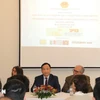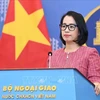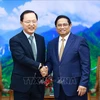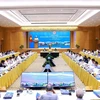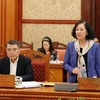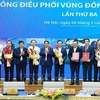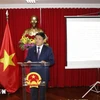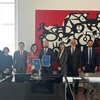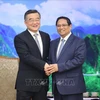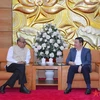The Government convened a regular session under the chairmanship of Prime Minister Nguyen Tan Dung on Aug. 4-5 to review socio-economic development during the first seven months and discuss plans for the coming time.
On the first day, the cabinet members heard reports on socio-economic development, which showed positive results in various fields.
Agricultural production was kept stable and industrial production resumed its growth over the past six months, except for January, the reports said.
Based on the results, the reports predicted the country’s GDP growth rate is likely to reach 5 percent, and inflation and deficit spending will be kept below 7 percent.
Concluding the session, PM Dung said drastic measures are still needed to fulfill the socio-economic targets set for 2009.
He listed five major tasks for the remaining months of this year--continuing the Government’s stimulus packages, maintaining the stability of the macro-economy, developing production in combination with promoting exports, accelerating the disbursement of capital resources, and paying attention to social security, with focus on 61 poor districts and individuals entitled to the State’s preferential policies.
The government leader asked the ministries, agencies and localities to prepare plans for 2010; take drastic steps to deal with issues related to the environment, afforestation and forest protection, and industrial and medical waste treatment; settle citizens’ long-standing complaints; and combat epidemics, particularly the A/H1N1 flu.
At the session, the cabinet members approved a draft resolution on a pilot plan to establish, organise, operate and manage State-owned economic groups, and five bills regarding natural resources taxation, child adoption, saving and effectively using energy, amendments and supplements to some articles of the Education Law, and information access right./.
On the first day, the cabinet members heard reports on socio-economic development, which showed positive results in various fields.
Agricultural production was kept stable and industrial production resumed its growth over the past six months, except for January, the reports said.
Based on the results, the reports predicted the country’s GDP growth rate is likely to reach 5 percent, and inflation and deficit spending will be kept below 7 percent.
Concluding the session, PM Dung said drastic measures are still needed to fulfill the socio-economic targets set for 2009.
He listed five major tasks for the remaining months of this year--continuing the Government’s stimulus packages, maintaining the stability of the macro-economy, developing production in combination with promoting exports, accelerating the disbursement of capital resources, and paying attention to social security, with focus on 61 poor districts and individuals entitled to the State’s preferential policies.
The government leader asked the ministries, agencies and localities to prepare plans for 2010; take drastic steps to deal with issues related to the environment, afforestation and forest protection, and industrial and medical waste treatment; settle citizens’ long-standing complaints; and combat epidemics, particularly the A/H1N1 flu.
At the session, the cabinet members approved a draft resolution on a pilot plan to establish, organise, operate and manage State-owned economic groups, and five bills regarding natural resources taxation, child adoption, saving and effectively using energy, amendments and supplements to some articles of the Education Law, and information access right./.

